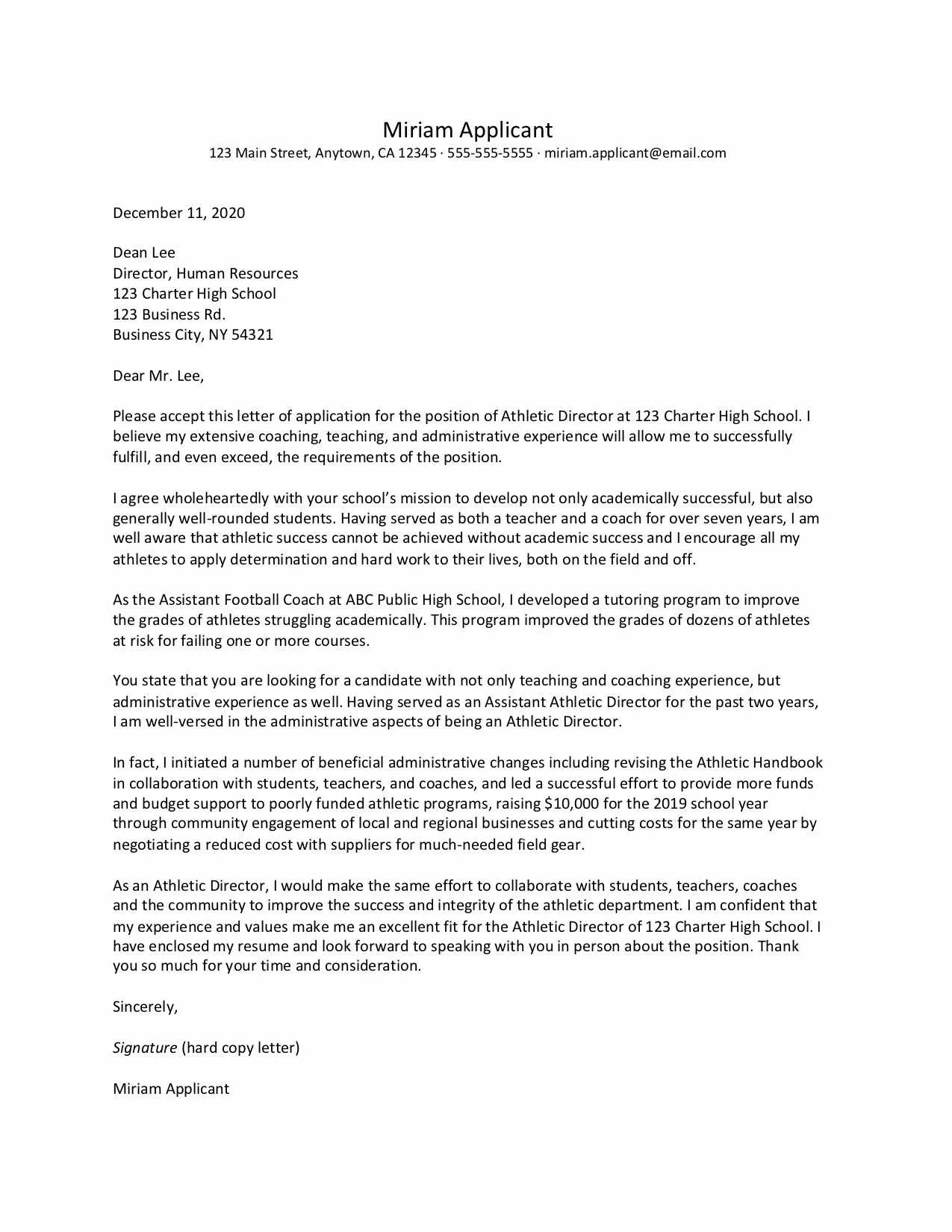Understanding the Athletic Director Role
An Athletic Director is a pivotal figure in any educational institution or sports organization, responsible for overseeing the athletic programs. This encompasses a wide array of duties, from managing budgets and hiring coaches to ensuring compliance with regulations and promoting the athletic department’s success. The role demands a multifaceted skill set, including leadership, communication, and financial management, as well as a deep understanding of sports and a commitment to student-athlete welfare. Aspiring athletic directors must understand the scope of the position before attempting to write a cover letter that showcases their suitability.
Key Responsibilities of an Athletic Director
The responsibilities of an Athletic Director are diverse and demanding. They are tasked with developing and implementing athletic policies, managing the department’s budget, and ensuring compliance with all relevant rules and regulations. Other key responsibilities include hiring, training, and supervising coaches and staff, overseeing the maintenance of athletic facilities, and coordinating schedules and events. Effective communication is crucial, as the Athletic Director serves as the primary liaison between the athletic department, the school administration, parents, and the community. Ultimately, the role is about creating a positive and successful athletic environment that supports the development of student-athletes.
Essential Skills for Athletic Directors
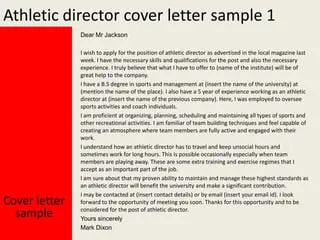
A successful Athletic Director possesses a combination of skills. Leadership and management are paramount, enabling them to guide and motivate a team of coaches and staff. Strong communication skills are essential for interacting with various stakeholders, from student-athletes to school administrators. Financial acumen is needed to manage budgets and allocate resources effectively. The ability to make sound decisions under pressure, coupled with a strategic mindset, is also crucial. Furthermore, an understanding of sports, including the rules, regulations, and nuances of various athletic programs, is fundamental to the role. An ideal candidate will also possess strong interpersonal skills and an ability to create a positive team environment.
Crafting a Compelling Athletic Director Cover Letter
Your cover letter is your first chance to make a strong impression. It should be more than just a list of your accomplishments; it should be a compelling narrative that showcases your skills, experience, and passion for the role. The goal is to persuade the hiring manager that you are the best candidate. A well-crafted cover letter complements your resume, providing a deeper look at your qualifications and why you’re a perfect fit for the specific position. It is imperative that you tailor each cover letter to the specific job and institution.
Header and Contact Information
Start with a professional header that includes your name, address, phone number, and email address. Ensure that your contact information is accurate and up-to-date. If you have a professional online presence, such as a LinkedIn profile, you can include a link as well. The header should be clearly formatted and easy to read, creating a professional first impression. Make sure it stands out yet is not distracting. Also, make sure you can be reached via the listed phone number and e-mail.
Addressing the Hiring Manager
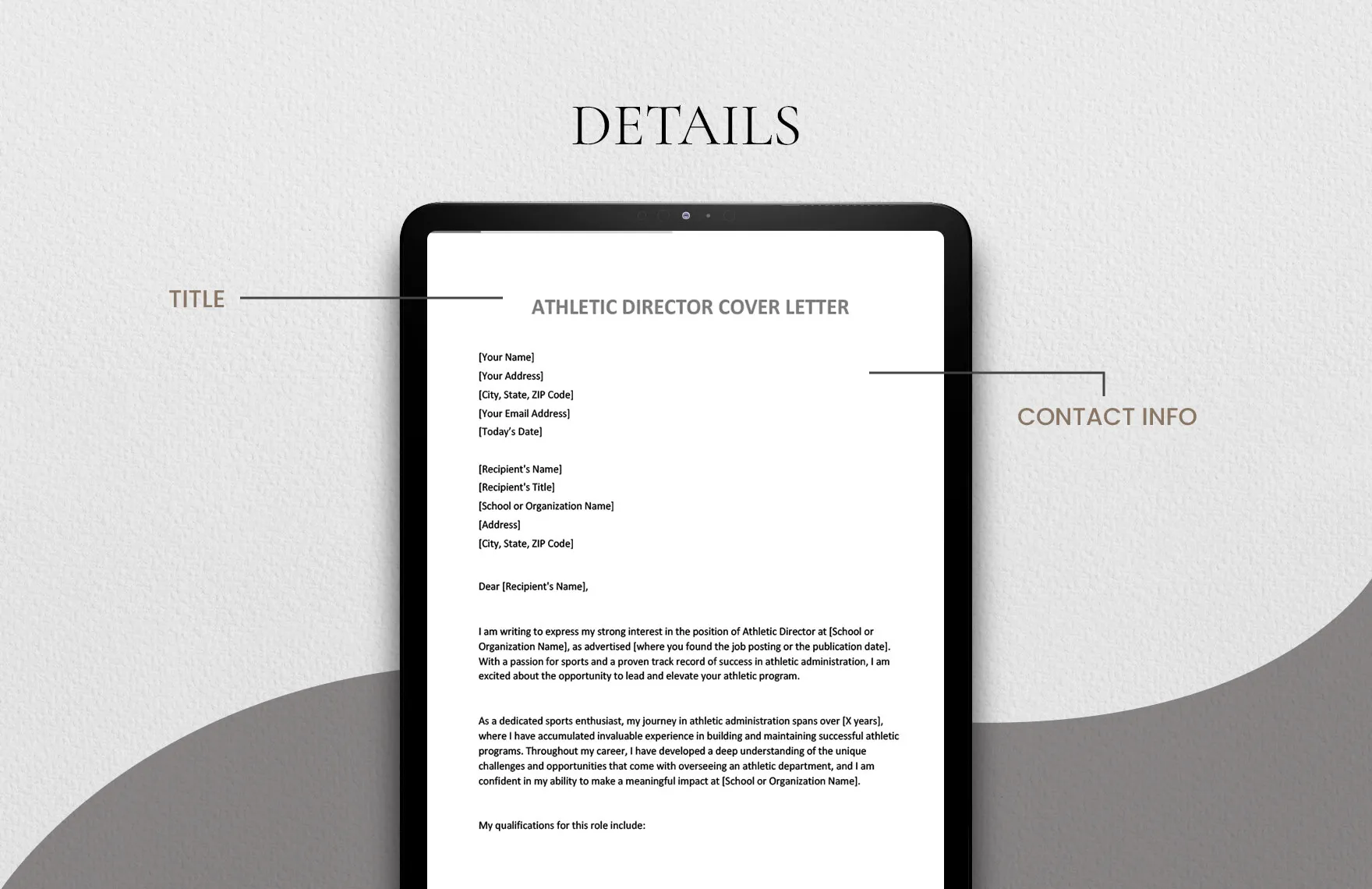
Always address your cover letter to a specific person if possible. Research the hiring manager’s name and title. Addressing the letter to a specific individual demonstrates your attention to detail and that you’ve taken the time to learn about the organization. If you are unable to find a specific name, use a professional salutation such as “Dear Hiring Committee” or “Dear [Department Name] Search Committee.” Avoid generic greetings such as “To Whom It May Concern.”
Opening Paragraph: Grabbing Attention
Your opening paragraph should immediately grab the reader’s attention. State the position you are applying for and where you found the job posting. Then, succinctly highlight your most relevant qualifications and express your enthusiasm for the role. Consider mentioning something specific that sparked your interest in the position or the institution. A strong opening sets the tone for the rest of your letter and encourages the reader to continue.
Highlighting Relevant Experience
In the body of your cover letter, provide details about your experience that directly relates to the athletic director position. Focus on accomplishments and responsibilities that demonstrate your skills in leadership, management, financial planning, and program development. Use action verbs to describe your achievements, and provide specific examples to illustrate your capabilities. Tailor this section to match the requirements and preferences outlined in the job description. Ensure your experience is presented in a clear, organized, and compelling manner.
Quantifying Achievements
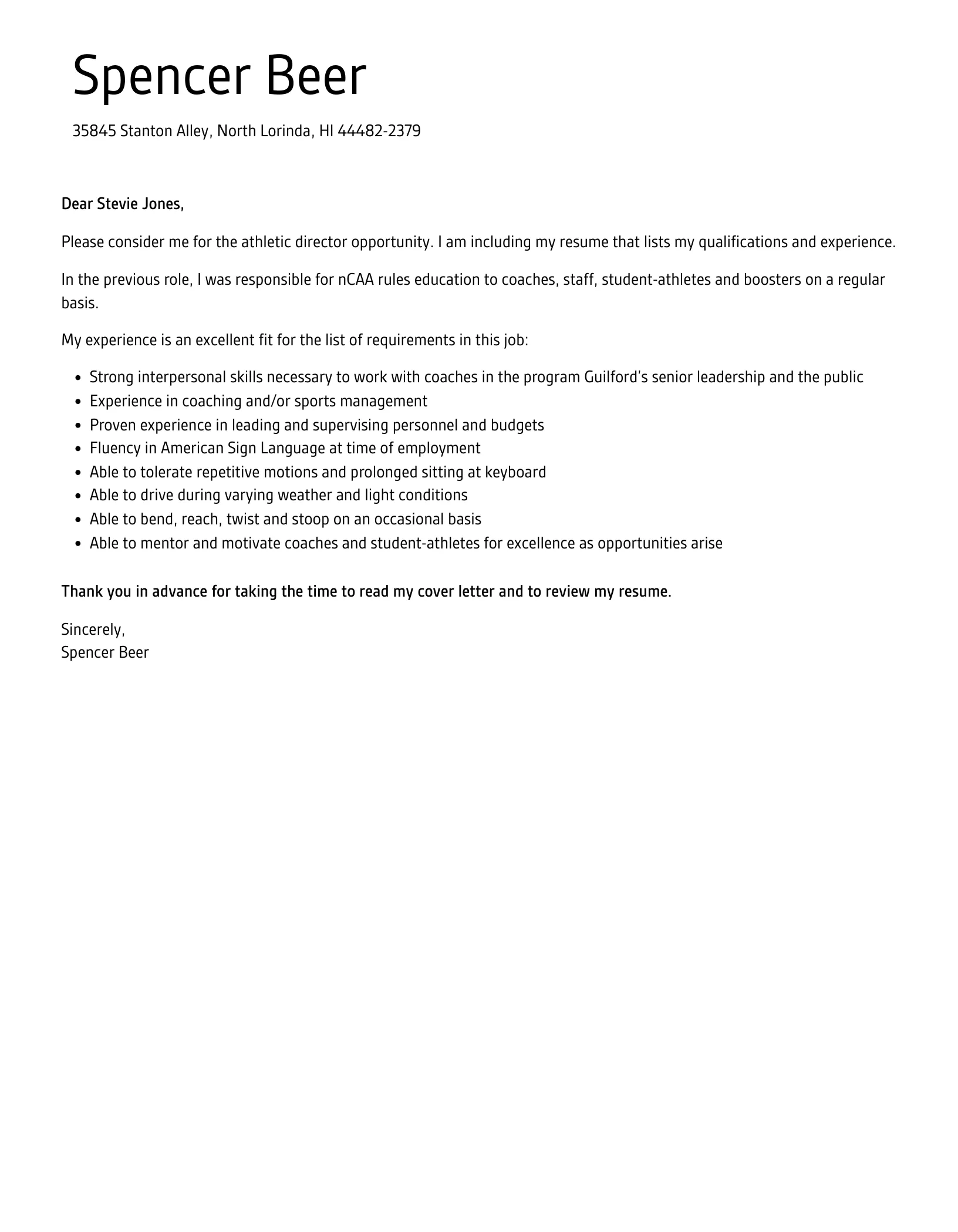
Whenever possible, quantify your achievements with data and metrics. Instead of saying “Improved team performance,” state “Increased team win rate by 20% over two seasons.” Quantifiable achievements provide concrete evidence of your abilities and demonstrate the impact you have made in previous roles. Examples might include budget management figures, fundraising results, or improvements in student-athlete academic performance. Use numbers to showcase your successes and make your qualifications more compelling. The more tangible results you can provide, the better.
Showcasing Skills and Qualities
Beyond your experience, highlight the skills and qualities that make you an ideal athletic director. This includes leadership, communication, problem-solving, and strategic planning abilities. Provide examples of how you have demonstrated these skills in past roles. Mention your ability to build relationships with coaches, staff, student-athletes, parents, and the community. Showcase your commitment to promoting a positive and inclusive athletic environment. Make sure that you incorporate the skills and qualities listed in the job description into your letter.
Demonstrating Passion and Enthusiasm
Express your passion for athletics and your enthusiasm for the specific role and institution. Explain why you are interested in working for this particular athletic department and what unique contributions you can bring. Show that you have researched the organization and understand its mission, values, and goals. This demonstrates your genuine interest and increases your chances of making a positive impression. Your enthusiasm should be evident throughout your letter, and should not seem contrived or forced.
Closing the Cover Letter
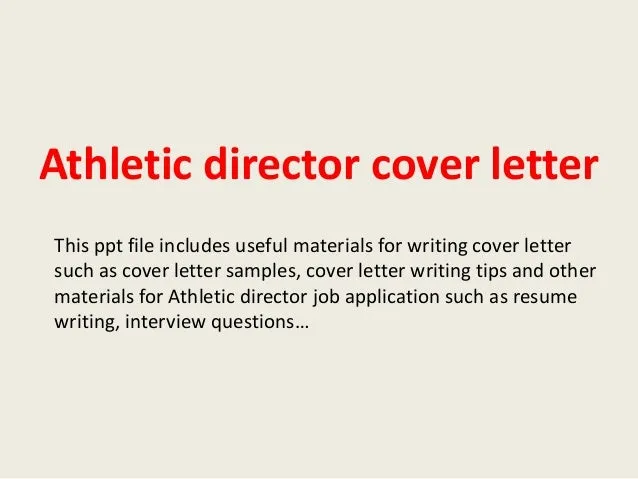
In your closing paragraph, reiterate your interest in the position and express your eagerness for an interview. Thank the hiring manager for their time and consideration. Include a call to action, such as stating that you look forward to discussing your qualifications further. Provide your contact information again and ensure your closing is professional and polite. Maintain a positive and confident tone throughout your conclusion.
Formatting and Proofreading
Formatting Your Cover Letter
Your cover letter’s appearance is as important as its content. Use a clear, professional font, such as Times New Roman, Arial, or Calibri, in a size between 10 and 12 points. Maintain consistent formatting throughout, including the spacing, margins, and alignment. Keep the letter concise and easy to read. Aim for one page, or at most two pages, to keep the reader engaged. A well-formatted cover letter demonstrates your attention to detail and professionalism.
Proofreading for Errors
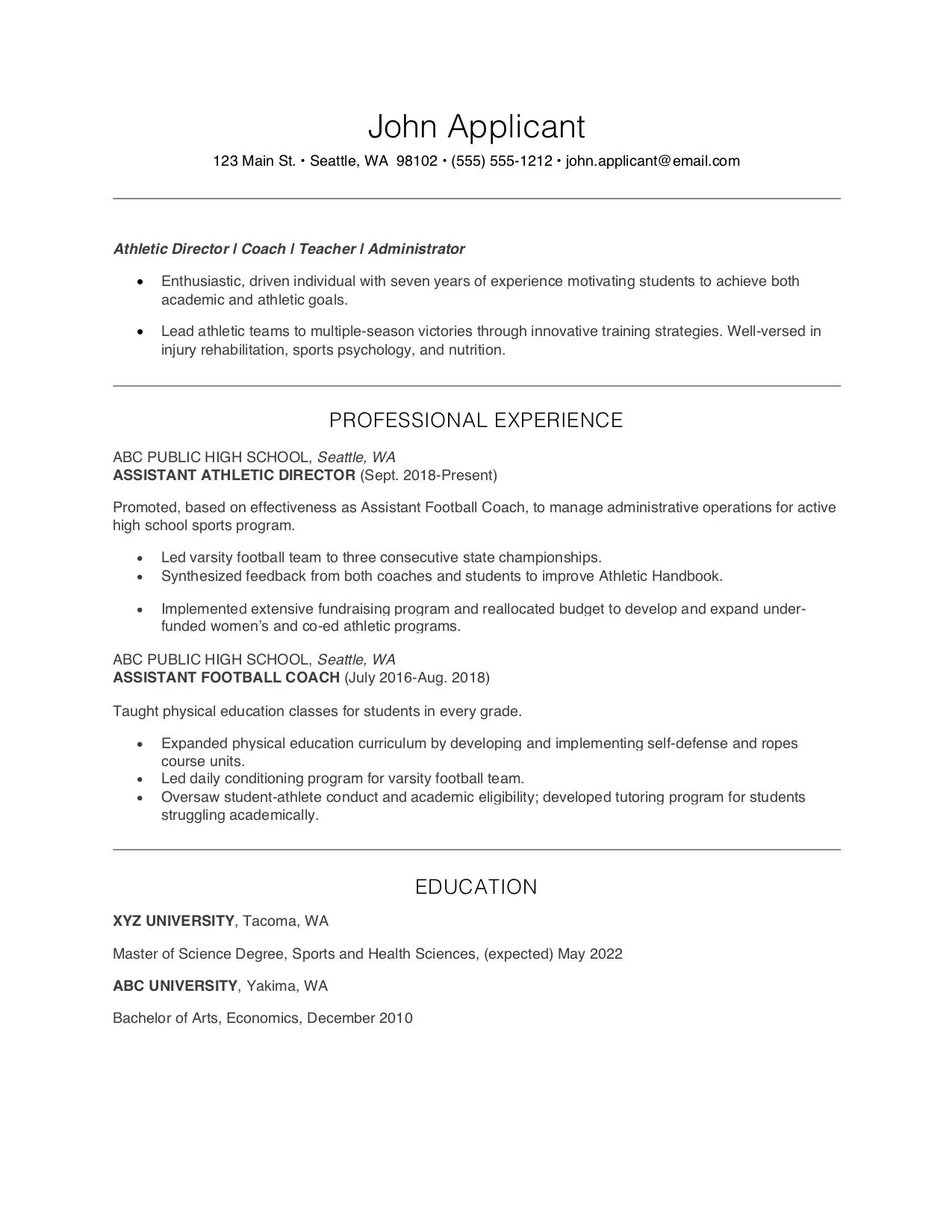
Thoroughly proofread your cover letter for any grammatical errors, spelling mistakes, or typos. Errors can undermine your credibility and detract from your qualifications. Use a spell checker and grammar checker, but also read the letter carefully yourself, and if possible, have someone else review it as well. Pay close attention to the details and make sure your writing is clear, concise, and error-free. A polished and error-free cover letter shows that you are meticulous and professional.
Cover Letter Samples and Templates
Reviewing sample cover letters and using templates can be helpful in guiding your writing process. Several online resources provide examples of cover letters for athletic director positions. These can give you ideas on how to structure your letter, highlight your qualifications, and use appropriate language. However, avoid simply copying a template. Customize the examples to reflect your own experience and tailor them to each job application. Use templates as a foundation and adapt them to fit your unique skills and the specific requirements of the role.
Athletic Director Cover Letter Sample 1
Here is an example of an Athletic Director cover letter, adjusted and modified. Use this sample as a starting point for crafting your own cover letter, and be sure to personalize it to fit the requirements of the job description and reflect your own unique qualifications and accomplishments. This should not be used verbatim; personalizing it will ensure your cover letter stands out. Review the job description before writing and incorporate those aspects.
Athletic Director Cover Letter Sample 2
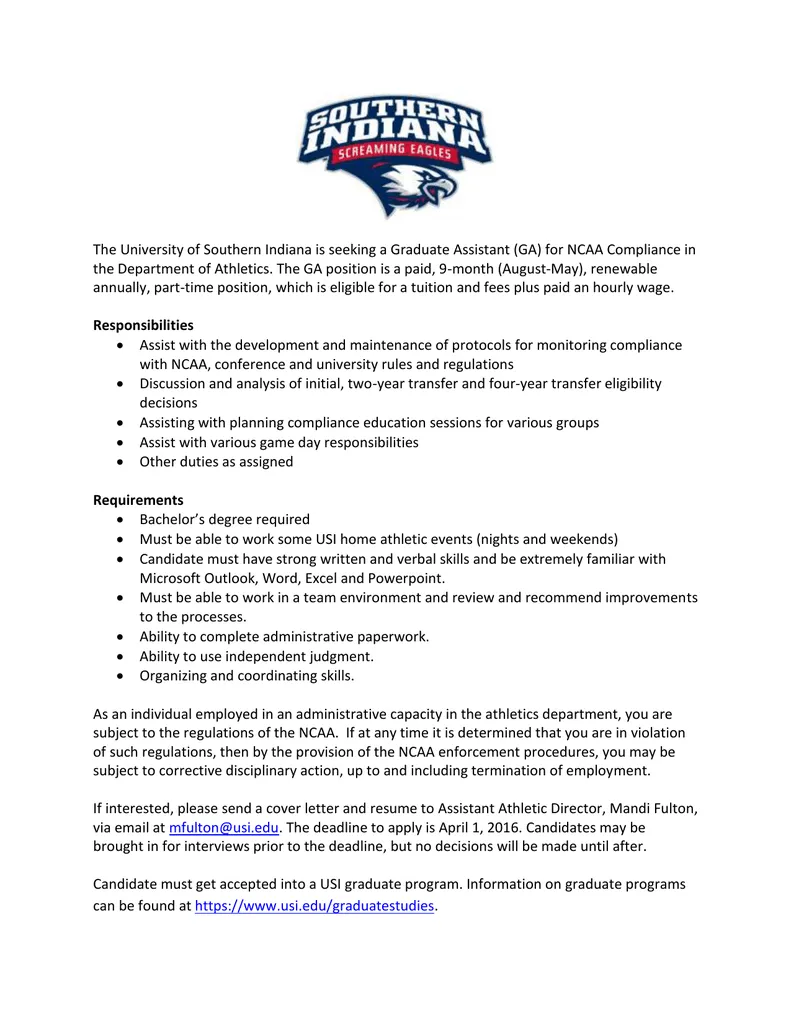
This sample should also be adjusted and modified to match the job description. Use it as a source of inspiration for your own cover letter. Make sure you have a strong opening paragraph, as well as an impressive and detailed list of accomplishments. Be sure to proofread and edit before sending it to any potential employers. This is the most important part of the process.
Common Mistakes to Avoid
Several common mistakes can diminish the effectiveness of your cover letter. Avoid generic language and clichés. Do not simply restate your resume; instead, provide more context and detail. Neglecting to tailor your letter to the specific job is a significant error. Ensure your letter is free of errors and inconsistencies. Failing to highlight your achievements is another common mistake. Finally, a poorly written cover letter can severely limit your chances of getting an interview. Make sure you are highlighting the best aspects of yourself.
By following these guidelines and avoiding common pitfalls, you can craft a winning cover letter that showcases your qualifications and secures you an interview for the Athletic Director position.
